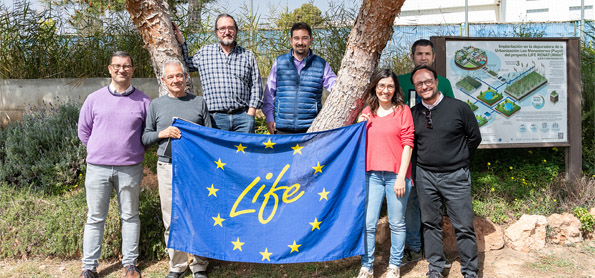Reintroduction of the spanish ribbed newt
LIFE Renaturwat project celebrates World Water Day with an initiative to enhance biodiversity and conservation of human-made wetlands
[ 27/03/2024 ]
The LIFE ReNaturWat project, led by the Universitat Politècnica de València, has celebrated World Water Day with an initiative to improve the biodiversity and conservation of the artificial wetlands created in Los Monasterios housing development in Puçol (Valencia): the reintroduction of specimens of the Spanish ribbed newt, a species of amphibian native to the area, in order to strengthen the core population and ensure the long-term growth of this community.
These vertebrates, known as Pleurodeles waltl, have historically been present in the ponds adjacent to the project site. Unfortunately, most of these have disappeared in recent years due to the drying up of the lagoons. In fact, this species is listed as vulnerable in the Valencian Catalogue of Threatened Fauna Species.
For this reason, last year, the Centre for the Conservation of Freshwater Species of the Valencian Community (Generalitat Valenciana) donated around fifty specimens to be reintroduced into the Puçol wetlands.
"During a recent sampling, one of these specimens was found. Specifically, an adult male Spanish ribbed newt, with very well developed dark forelimbs, indicating that it is already in the reproductive phase," the LIFE ReNaturWat project points out.
To strengthen the core population and ensure the long-term growth of this community, it was decided to make an additional introduction.
"The reintroduction of Pleurodeles waltl is an important step in conservation efforts in the area and demonstrates the commitment of the LIFE project partners to the protection and conservation of native species. Not only do we want to reduce water pollution, but we also want to improve biological quality, create habitats and sequester carbon, which is essential to mitigate climate change," says Miguel Martín Monerris, a researcher at IIAMA-UPV and project coordinator.
The Spanish ribbed newt
The Spanish ribbed newt is emerging as a symbol of Iberian biodiversity, as it is the largest amphibian urodele in Europe and a true treasure of nature. This species is characterised by its dual habitat, thriving in aquatic and terrestrial environments.
Known for its ability to adapt to temporary water areas, the Spanish ribbed newt leads two distinct lives: aquatic and terrestrial. The first autumn rains trigger its reproductive period, which lasts until early spring, allowing it to reproduce continuously for several months.
As far as its diet is concerned, the Spanish ribbed newt is a voracious predator, consuming aquatic insect larvae, crustaceans, annelids and other small aquatic creatures. Its diet even includes cannibalism, and it contributes significantly to the control of mosquito and other insect populations.
The LIFE ReNaturWat project
The LIFE ReNaturWat project, funded by the European Union through the LIFE programme, is led by researchers from the IIAMA-UPV (Institute of Water and Environmental Engineering of the Universitat Politècnica de València), Miguel Martín Monerris and Carmen Hernández Crespo.
In a consortium comprising organisations such as Global Omnium, EMIVASA, the Water Economics Group of the University of Valencia, Global Nature Foundation, Aguas de Portugal, EFE Agency, the Municipality of Carrícola, Valle Residencial Los Monasterios and Fundació Mediambiental, the main objective of the project is to improve the environmental quality of urban wastewater through sustainable treatment.
To this end, they have built artificial wetland prototypes at the Carrícola and Los Monasterios (Puçol) wastewater treatment plants in the Valencian Community, using an adsorbent material such as sludge to treat urban wastewater.
"The project integrates the principles of the circular economy by improving the environmental quality of urban wastewater through sustainable treatment. Dewatered sludge from water treatment plants reflects a circular approach by transforming waste into resources for sustainable water treatment. This not only helps to reduce pollution but also promotes resource efficiency and sustainability throughout the wastewater treatment process," concludes LIFE ReNaturWat.
Outstanding news
 Study a degree at the best technological university in Spain
Study a degree at the best technological university in Spain
The Universitat Politècnica de València is ranked number 1 among Spanish technology universities, according to the Shanghai ranking
 Highly Cited Researchers 2025
Highly Cited Researchers 2025
Avelí Corma, Juan Bisquert and Luis Guanter, the international scientific elite with a Universitat Politècnica de València hallmark
 Historic Milestone in Spanish Higher Education
Historic Milestone in Spanish Higher Education
The UPV inaugurates the Beihang Valencia Polytechnic Institute, the first Spanish university center in China
 Study in English
Study in English
The UPV offers eight degrees, 16 master's and 650 courses in English for the 2025-26 academic year
 A Latin Grammy... with the UPV hallmark
A Latin Grammy... with the UPV hallmark
'Music teaches us to listen and live together,' says Rafael Serrallet, Doctor of Music at the UPV, awarded in Las Vegas as the author of the Best Instrumental Album of 2025
 THE Impact Ranking
THE Impact Ranking
The UPV, the Spanish university with the greatest social and economic impact in the world

